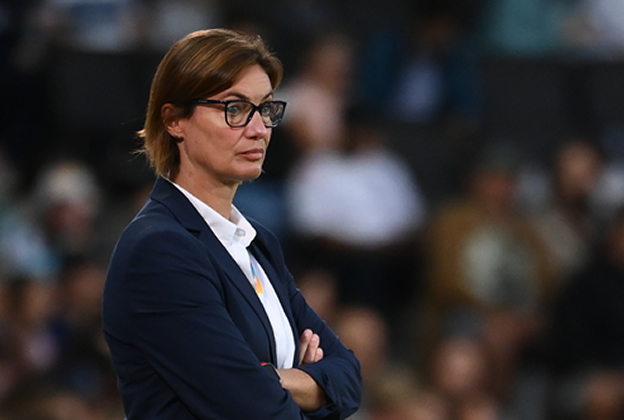Corinne Diacre has been sacked as coach of the France women’s team just months before the Women’s World Cup after her position was weakened following a revolt by leading players.
The 48-year-old was under contract until 2024 but came under serious pressure after captain Wendie Renard announced last month she would no longer play for the team, with fellow stars Kadidiatou Diani and Marie-Antoinette Katoto following suit.
The announcement by the French Football Federation (FFF) on Thursday comes just over four months before the World Cup in Australia and New Zealand, where a France side ranked fifth in the world will hope to feature prominently.
The French federation — itself in crisis following the recent resignation of its scandal-hit 81-year-old president Noel Le Graet –- said its own investigation had exposed “a major fracture with senior players” which had “reached a point of no-return that was damaging the team’s interests”.
“The FFF acknowledges the implication and the seriousness with which Corinne Diacre and her staff have done their job, but it seems the problems are, in this context, irreversible,” it added.
“In view of this, it has been decided to bring an end to Corinne Diacre’s job at the head of the France women’s team.”
Lyon defender Renard, who has 142 caps and is widely considered as one of the best players in the world, exposed that fracture when she announced last month that she would not go to the World Cup.
“I can no longer support the current system which falls a long way short of the demands required to compete at the highest level,” Renard said.
Paris Saint-Germain forward Diani, the top scorer in the French league who like Renard was nominated for last year’s Ballon d’Or, followed suit along with her PSG teammate Katoto.
“We have reached a point of no going back. The girls just can’t cope with it any more,” Diani told broadcaster TF1 last weekend, but the sacking of Diacre could now see those stars come back into the fold.
Diacre had told AFP on Wednesday that she had been the victim of a “smear campaign” and that she was “completely determined to carry out my job and, above all, to do France proud at the next World Cup”.
She had been hoping to stay in the position until after next year’s Olympics in Paris.
– Divisive reign –
Diacre has an admirable CV, from winning 121 caps as a player to a groundbreaking three-year spell in charge of men’s team Clermont in the French second division.
But she has been a divisive figure as France coach, from the moment she stripped Renard of the captaincy early in her reign.
Another Lyon star, midfielder Amandine Henry, skippered the team at the 2019 World Cup but has been out of the picture since late 2020 and also fell out with the coach.
Under Diacre, France lost to the United States in the quarter-finals as they hosted the 2019 World Cup.
Les Bleues then lost to Germany in the semi-finals of last year’s European Championship in England.
No new coach has been appointed, with France next due to play home friendly matches against Colombia and Olympic champions Canada in April.
The FFF said that its interim president, Philippe Diallo, had asked a committee to speak to potential candidates “as soon as possible”.
Diallo said following a meeting Thursday at FFF headquarters in Paris that a four-person committee set up to examine the running of the women’s national team had “unanimously” recommended moving on from Diacre.
Current PSG coach Gerard Precheur is among the names being linked to the vacancy.
France are not the only team in crisis with the World Cup approaching.
Spain, ranked seventh in the world, were plunged into disarray last September when 15 players resigned en masse, calling for major changes.
However, the Spanish Football Federation backed coach Jorge Vilda and none of the rebels have featured since.
Canadian players recently threatened to strike in a row over pay, funding and contractual issues, demanding the same terms as the men’s team. The dispute led to the president of Canada Soccer resigning.
France begin their World Cup campaign against Jamaica in Sydney on July 23.
Source: The Punch








